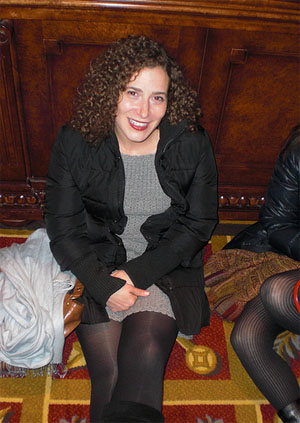Lizzie Skurnick appeared on The Bat Segundo Show #302.
Lizzie Skurnick is most recently the author of Shelf Discovery. She previously appeared on The Bat Segundo Show #13.
Condition of Mr. Segundo: Sacrificing his manhood to fight the patriarchal overlords.
Author: Lizzie Skurnick
Subjects Discussed: [List forthcoming, but oh quite a strange potpourri! Everything from redheads, television rape, Jean Auel, whether patriarchy or elitism is responsible for YA/genre ghettoization, and whether or not Judy Blume’s Wifey involves punishing the heroine.]
EXCERPT FROM SHOW:
 Skurnick: You know, you make up a story for what you’re trying to do later, but who knows what you were trying to do?
Skurnick: You know, you make up a story for what you’re trying to do later, but who knows what you were trying to do?
Correspondent: Well, then I’m going to go ahead and put my own particular question of interest to you.
Skurnick: Go for it.
Correspondent: Okay. The concern for redheads in your review of The Moon by Night.
Skurnick: Oh.
Correspondent: The author who has the redheaded stepchild in A Gift of….A Gift of Magic. Yes. I’m sorry. My handwriting’s terrible. But I found out last night that there are, in fact, a streak of redheaded people in your family.
Skurnick: Yes.
Correspondent: And so, as a result, I must put forth the psychological question to you, Ms. Skurnick, over whether this preoccupation with redheads reflects this familial genetic scenario.
Skurnick: Okay. It’s hilarious. Because if you — I don’t know if you notice this at the party. Because not all of my friends were at the party. But my Grandma Dora was a redhead, my father is a redhead, my Aunt Francine is a redhead. Growing up, one of my good friends Becky was a redhead. I think I have another good friend who was a redhead. And throughout my life — it’s hilarious — two of my dearest friends — Casey and Jane — were redheads. I have dated many redheads. And my new nephew Asher is a redhead. So I think that certainly I have a huge streak of redheadedness in my life. And I could not tell you why. And it is actually funny. Because whenever I write about Meg’s boyfriend — Calvin is redhead — and there’s quite a few redheads in L’Engle, in general. You know, Polyhymnia is a redhead. Calvin’s daughter. And when you write about it, there’s always a few girls in the comments who will go, “Oh, Calvin, I love a ginger!” Like if you do it with Prince William and his brother, you’ll get that too. So there is — that is a theme in my life. But it is also a theme in YA.
Correspondent: Yeah.
Skurnick: It’s a huge theme in YA. And I don’t know. I guess it’s because — I’ve never understood this because, like I said, there’s zillions of redheads in my life. But redheadness in society does always — it’s like you are marked as a very different thing. Everybody looks at redheads. You know, when Asher, my nephew, was born, it was the first thing five people told me. And then when people looked at him, they would say, “He’s a redhead.” You know, that’s like the first thing. And so I guess it’s often a little bit of what the author is talking about. You know, the sense of being deliberately put outside. And then what do you do with that? What do you do with the fact that you are an individual. You know, redheads are forced from a very young age to be individuals in the way that we are not. And I think maybe that’s…
Correspondent: I was a redhead, you know.
Skurnick: Really?
Correspondent: Yeah, yeah. You’re drawing a generalization here. But I’ll let you continue. I am very curious to hear your answer.
Skurnick: Well, all of the redheads in my life are actually like fire red. You know, it doesn’t go away. Like I actually have some red in my hair, although you can’t tell right now. Because it’s wet.
(Image: Tayari Jones)
BSS #302: Lizzie Skurnick II (Download MP3)

